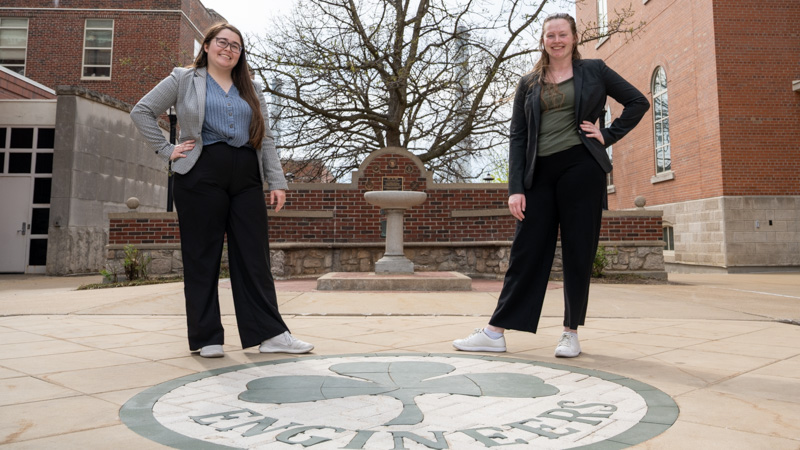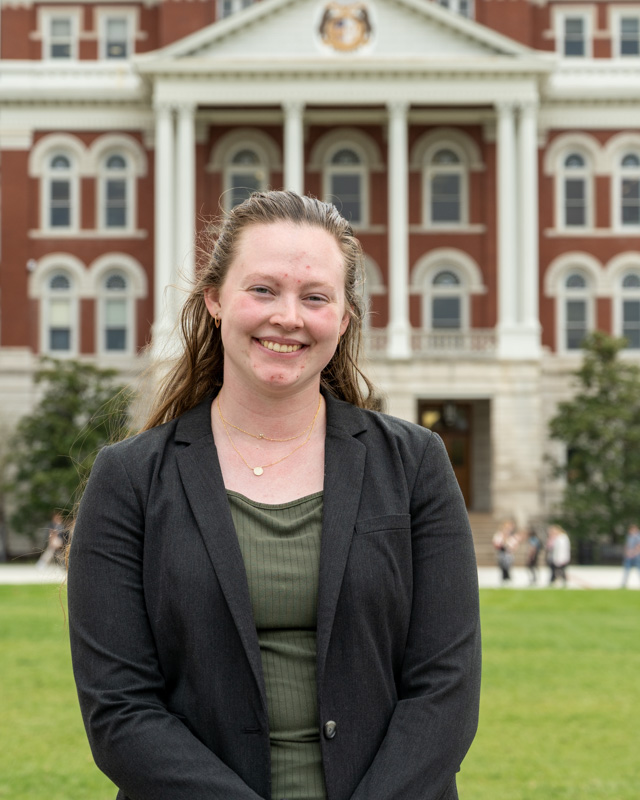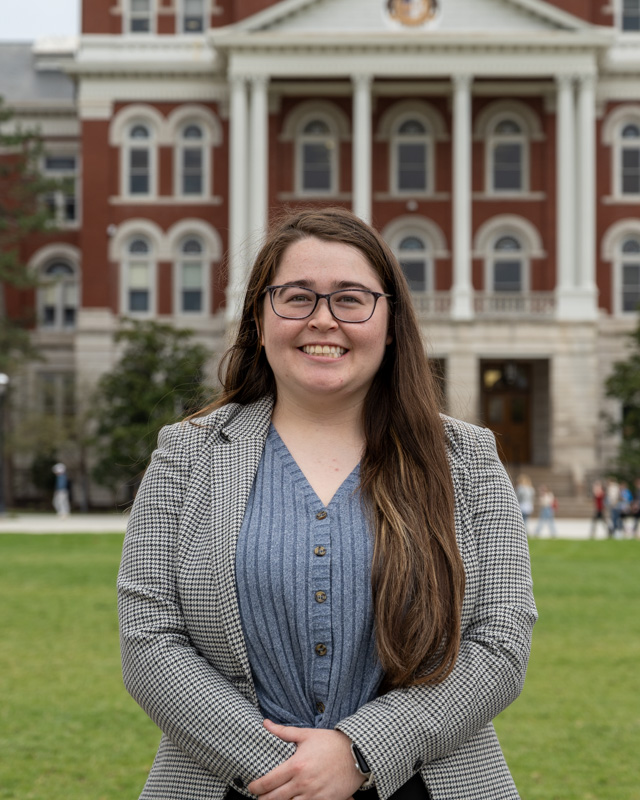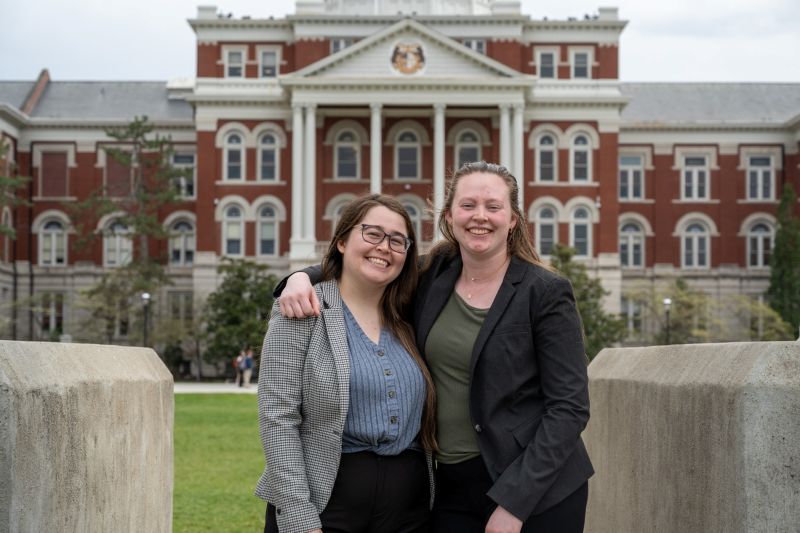April 16, 2025
After spending their undergraduate years conducting research with life-saving implications, Emma McDougal and Marissa Moore each received National Science Foundation Graduate Research Fellowships.

Mizzou Engineers innovate with intention, leveraging their personal experiences to find better ways of doing things and creating meaningful change.
Mizzou seniors Emma McDougal and Marissa Moore are taking their passion for life-changing research with them into graduate programs, funded by National Science Foundation Graduate Research Fellowships (NSF GRFs).
The NSF GRF program helps ensure the quality and vitality of the scientific and engineering workforce through three years of financial support for graduate researchers. This year, only 1,000 students across the country received the award.
McDougal and Moore are both studying chemical engineering at Mizzou. Not only do they work in the same lab with the same advisor, but they also happen to be roommates.
“We found out that we both received the award right at 11 p.m.,” McDougal said. “I kept refreshing the page until it released. When I saw my name, I was almost in shock, I was so excited. Then I saw Marissa’s name below mine and I immediately told her to check her computer to make sure she saw the same thing.”
Marissa agreed.
“When I saw our names, I was almost in disbelief,” she said. “The outpouring of support from everyone in our community has been really wonderful. This award really opens doors, I’m excited to get to continue researching what I’m passionate about.”
Moore and McDougal are both advised by Bret Ulery, associate professor of chemical engineering. Ulery specializes in biomaterials, but for Moore and McDougal, those materials have vastly different applications.

Targeted cancer treatment
McDougal wants to improve our ability to fight cancer and improve quality of life for cancer patients. When she was younger, her best friend was diagnosed with acute lymphoblastic leukemia. This transformative experience opened her eyes to cancer patients’ everyday struggles.
“In high school, I found I had significant competencies in STEM areas,” McDougal said. “Realizing I could solve problems affecting people I care about is what brought me to biomedical research and the project I’ve been working on.”
McDougal’s work centers around targeted drug delivery. This field generally focuses on making sure that drugs get to specific locations in the body at specific times and at the correct dosage. Using targeted drug delivery strategies for cancer applications can reduce side effects, improve patient comfort and improve our ability to get rid of cancer cells, she said.
“What I’ve done at Mizzou has focused on targeted delivery of cancer therapeutics using peptide amphiphile micelles,” she said. “One of the big issues with the treatments we currently have are side effects. Chemotherapies are not specific to the bad cells; they kill all cells. The goal of my work is to develop a platform to deliver therapeutics to cancerous cells but not healthy ones.”
She got her start in research when Mizzou’s Stamps Scholar program connected her with faculty researcher Matthias Young her freshman year. He recommended based on her interests for her to work with Ulery.
McDougal initially focused her research on chemical synthesis but has expanded her attention to biological work and materials science.
“I’ve really loved my time in the lab because I’ve gotten a taste of everything,” she said. “I’m grateful to the NSF for this funding award to continue making new discoveries in this field.”

Preventing the spread of injuries
Like McDougal, Moore’s inspiration is personal. When her younger sister was diagnosed with cerebral palsy and epilepsy, she noticed a treatment gap for neurological disorders and disabilities.
“We have treatments, but we don’t have a way to deliver them to patients who need them,” she said. “I wanted to do something to help people like my sister, but I knew being a doctor wasn’t for me. When I learned you could do research in engineering, I knew that this would become my path.”
Moore’s work focuses on developing a way to deliver the antioxidant N-acetylcysteine into the body. Antioxidants prevent damage in cells, such as those in the spinal cord. This is why doctors recommend eating blueberries.
“We know this antioxidant has promise to prevent injuries,” Moore said. “Now we need to develop a method to deliver it at critical times and allow it to do so.”
Moore is developing injectable biomaterials to deliver N-acetylcysteine into the body. Her work will enhance treatment options for people who have recently been injured, such as in a car crash, by sustainably delivering this antioxidant to prevent further injury.
Moore fell in love with research as a high school intern in Ulery’s lab. She chose to attend Mizzou to maintain access to the research opportunities and facilities offered on campus.
“It’s been a great experience because I’m doing really impactful research as an undergraduate,” she said. “In graduate school, I plan to continue making strides in addressing neurological treatment gaps.”

Ready for what comes next
The researchers’ focus areas will take them to different corners of the country after graduation in May. McDougal is headed to the Massachusetts Institute of Technology for her PhD in chemical engineering. Moore will also pursue a PhD in chemical engineering at the Ohio State University.
“Marissa and I have been teammates, coworkers, and peers for a long time now, so going through this together makes it even sweeter,” McDougal said. “Even though we’re going off to different institutions in the fall, I’ll always be grateful for this moment we get to share together.”
Moore wants their experience to inspire others.
“I’m excited for not just my future in graduate school, but also for the future of chemical engineering at Mizzou,” Moore said. “I hope that both of us receiving this award can encourage more students to get involved in research, especially students who are on the fence about whether they’re ready for it. Because they are, they just need to take the step.”
Mizzou Engineering has had five students receive NSF GRF awards in the last three years. This year, alumni Zach Loschinskey, BS BME ’23, and Maria Lusardi, BS CS ’23, also received honorable mentions for the award.
Drive life-changing research as an undergraduate. Choose Mizzou Engineering!
Read more about Mizzou’s NSF GRF 2025 honorees.